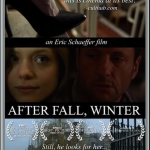On Thursday, October 17th, 7pm, I am presenting at the Vancouver’s Arts Club Theatre’s production of Venus in Fur, a two-hand play by David Ives.
Thomas, a playwright and first-time director doing a production based on Leopold von Sacher-Masoch’s Venus in Furs, has an audition with “Wanda” (or Vonda), a struggling actress desperate for the part of Wanda, who turns out to be much more than she appears.
Venus in Fur takes certain liberties with the source material, which ordinarily would annoy me, but considering that we are in the realm of psychosexual fantasy, it’s entirely appropriate that Thomas’ play-within-a-play reorders events, skips the framing story of the novel, and reworks the ending. After all, Venus is Sacher-Masoch’s reworking of his own affair with Fanny Pistor, which was informed by his own pre-existing fantasies about cruel women. Then there’s Vonda’s apparently off-the-cuff rewrites and improvisations of her character and the play; if there was ever a book that cried out for a feminist rewrite, Venus is it. They’re fighting over the meaning of the text, over the meaning of Wanda and whether she has any meaning beyond a fetishized projection of Thomas/Severin/Leopold’s own ego. Is Venus in Furs a neglected work of classic literature or a 140-year-old stroke book?
Lindsey Angell as Vonda really shines, switching back and forth between lady and tramp, ditz and diva, ingénue and fury, and peeling back the layers of Vincent to get at his own obsessions. It’s a master-class in topping from the bottom. Vincent Gale’s Thomas doesn’t stand a chance.
I’ll be speaking on the historical background and the complicated chain of rewriting that provides a context for Venus in Fur(s), as well as Leopold von Sacher-Masoch’s peculiarly subtextual literary legacy (or lack thereof).





[…] in Polanski’s French film adaptation of David Ives’ play La Vénus à la fourrure (2013), aka Venus in Fur. Like Mimi, Vanda is a projection of heterosexual male desires and anxieties, not a realistic […]